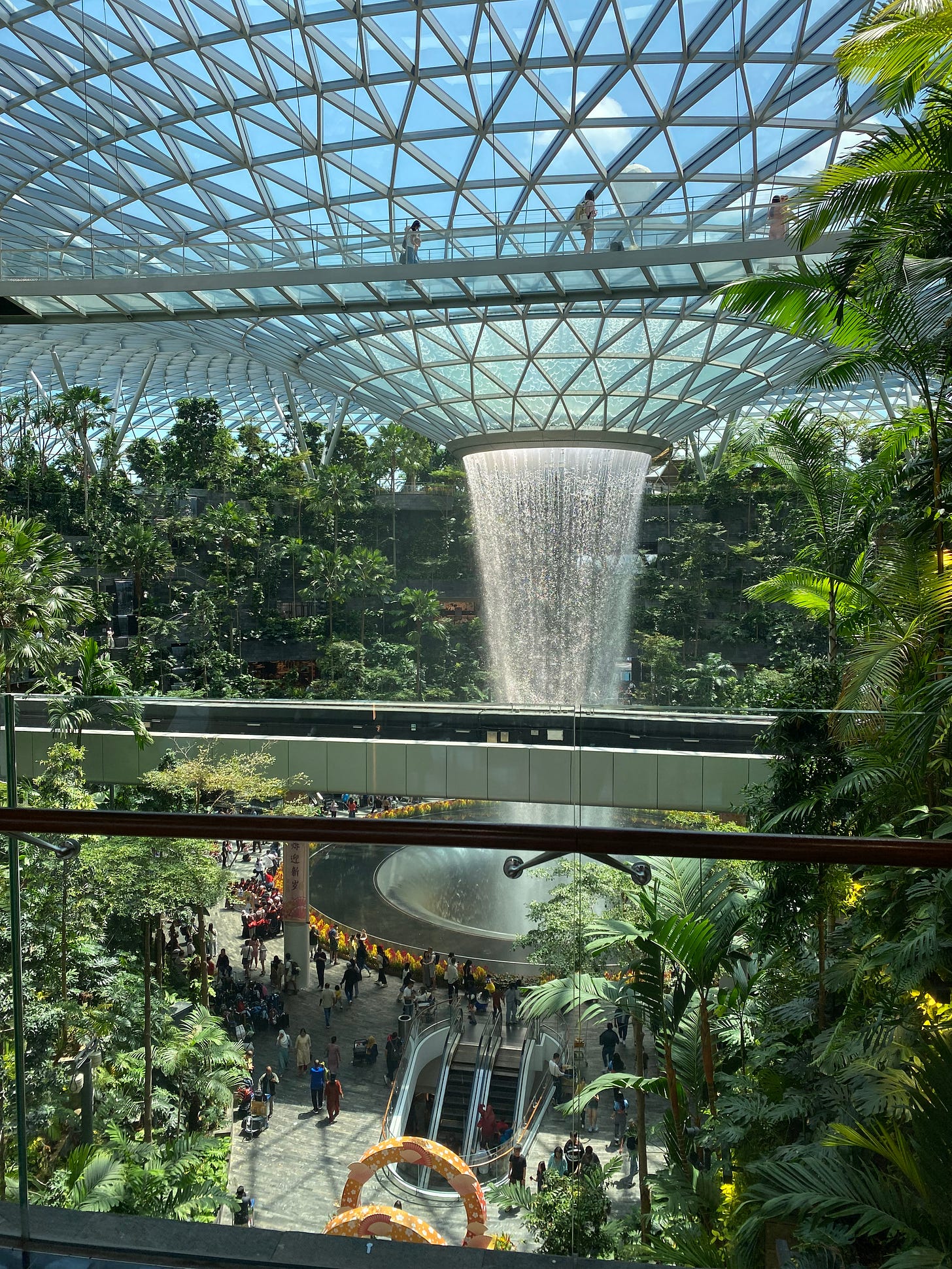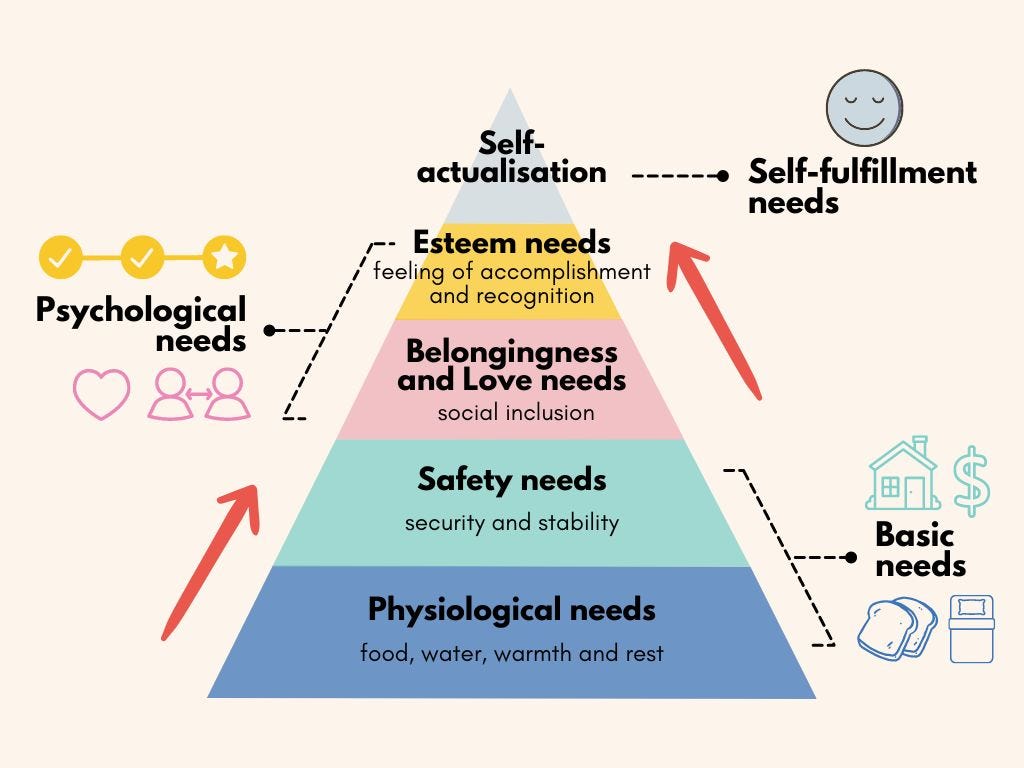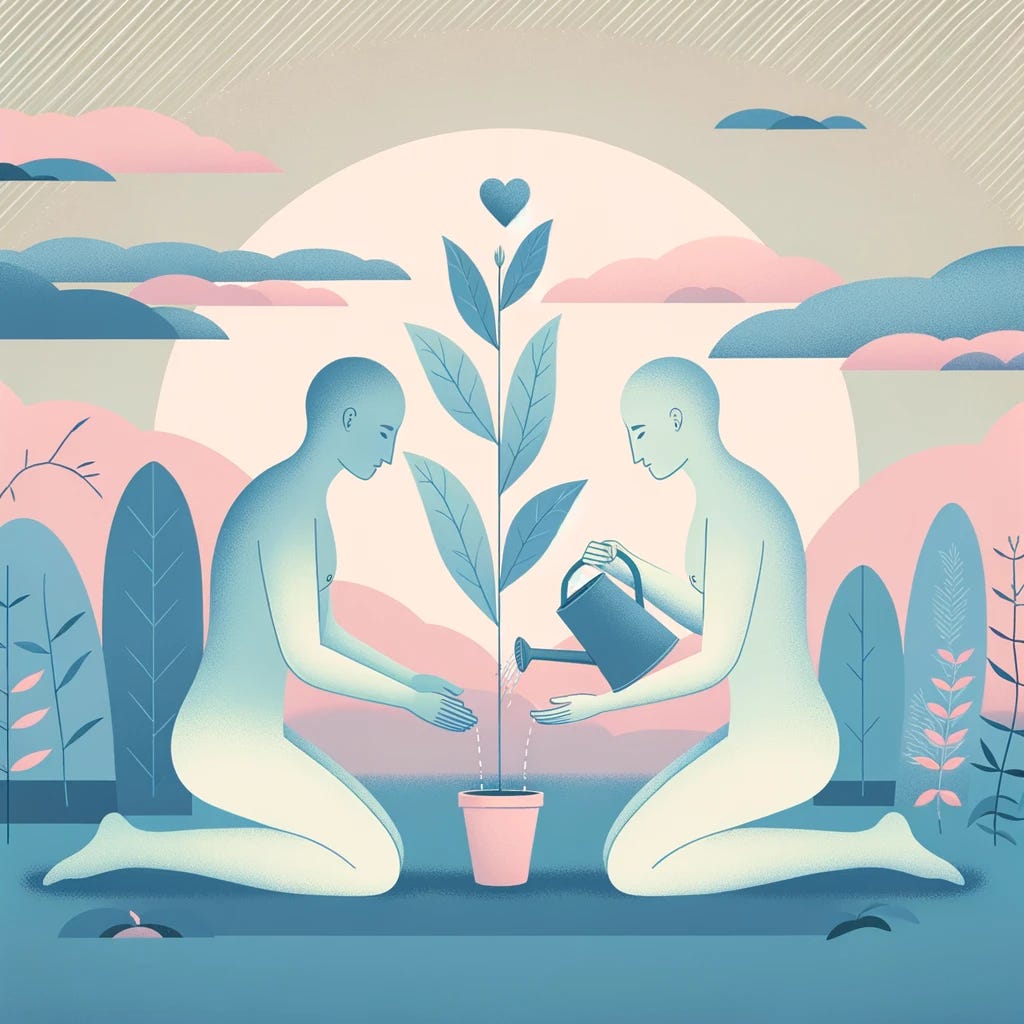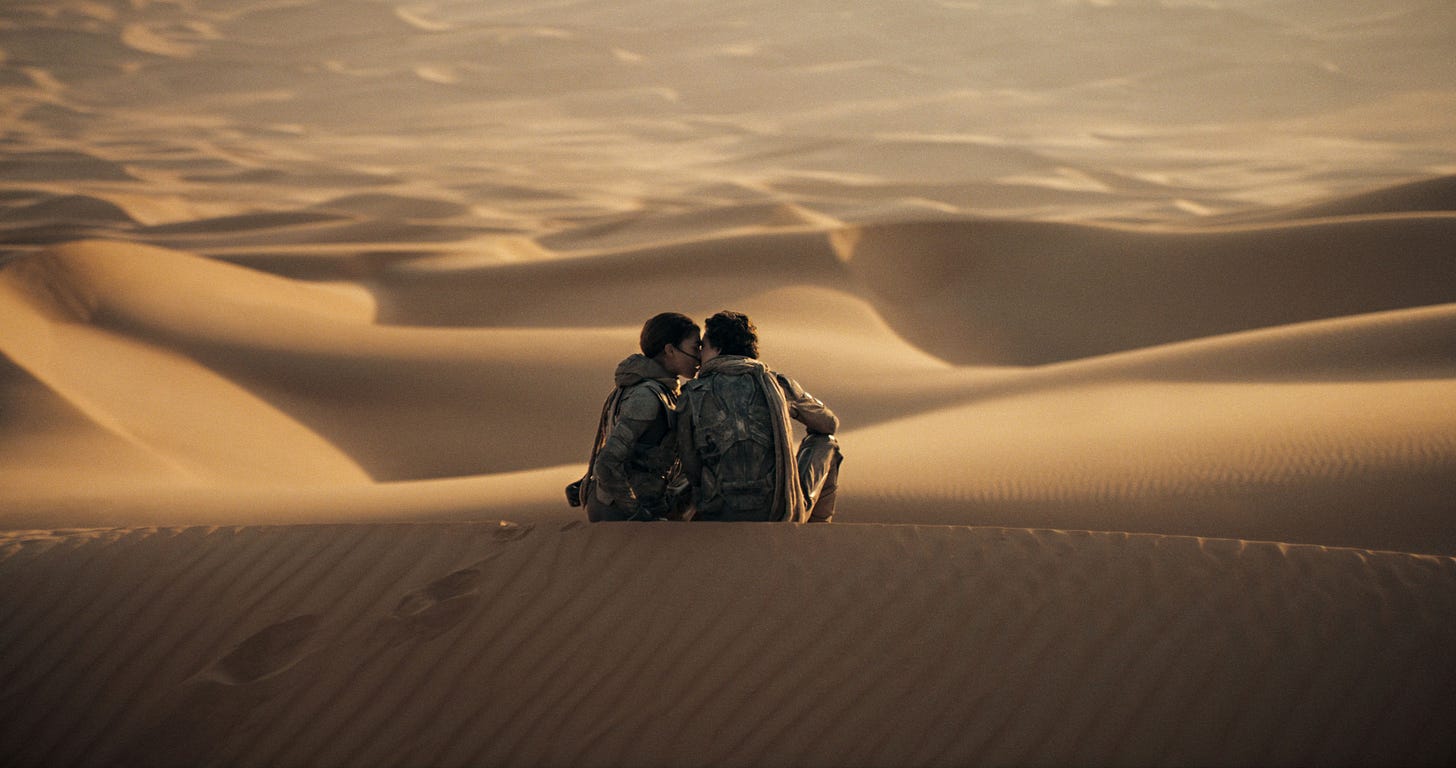What is Happening With Love?
Self-love and its implications for understanding what it truly means to love and be loved
In 2020, as the COVID-19 pandemic gripped the world, it ushered in not only a wave of fear and uncertainty but also a moment for collective introspection. Amidst the upheaval, a certain song resonated deeply, becoming an anthem of our shared vulnerability and longing for connection. The touching lyric of “If The World Was Ending” struck a universal chord, reminding us of our intrinsic need for love and companionship during the most tumultuous times.
The song, which garnered a Grammy nomination in 2021, unwittingly encapsulated the global sentiment during the lockdowns, emphasising how, when faced with the ultimate threat, our thoughts turned towards those we cherish. It begs the question: what truly sustains us when the world feels like it’s crumbling?
What does it all mean?
“It is quite true that man lives by bread alone — when there is no bread. But what happens to man’s desires when there is plenty of bread and when his belly is chronically filled?” — Abraham Maslow
Maslow’s Hierarchy of Needs, a psychological theory, categorises human needs into five-tier model of ascending importance. Starting from the base, it illustrates how basic needs must be satisfied before higher-level needs can become meaningful. It’s a crucial framework that provides a comprehensive understanding of human motivation, the progression beyond mere survival, the quest for growth and fulfillment, and the nuanced interplay between different levels of needs.
Or as articulated by Maslow himself, “In any given moment we have two options: to step forward into growth or step back into safety.”
Our motivations evolve based on our circumstances. In scarcity, our actions are driven by the urgency of survival. In abundance (when the basic needs are met), we are propelled by deeper, more complex desires and aspirations — in order to satisfy our psychological needs.
So, what do we want?
People in modern societies typically find their physiological needs for sustenance and their safety needs for security and protection well met, yet it’s the attainment of love and belonging, Maslow’s third tier, where many experience a shortfall, indicating a societal gap in meeting these crucial emotional and social needs. (I covered this in - “Why Are We So Bad At Getting The One Thing We All Want?”)
There is a widespread struggle to forge meaningful relationships and community ties in an increasingly disconnected and competitive world. (Read: “Alone Together: Why We Expect More from Technology and Less from Each Other” by Sherry Turkle)
Parallel to this is the ongoing Harvard Study of Adult Development, one of the world’s longest studies of adult life, which revealed profound insights into happiness and well-being. Spanning over 85 years, the Grant Study underscores that close relationships, more than money, fame or health, are what keep people happy throughout their lives.
Here, Maslow’s theory and insights from Harvard’s landmark study converge, highlighting a universal truth that our well-being is inextricably linked to love.
The meaning of love
“Love is that condition in which the happiness of another person is essential to your own.” — Robert A. Heinlein
Love is recognised as the fundamental driving force across various aspects of life. Not just in interpersonal relationships, but in our connections with ourselves, our passions, our environment, and even inanimate objects that hold meaning to us.
When someone dedicates themselves to a career, it’s a pursuit of self-love, personal fulfillment, and sometimes, the love for the craft itself. The validation and acceptance they seek might also reflect a desire for connection and recognition, essentially forms of love from others. Similarly, when individuals engage with art, care for pets, or even appreciate the beauty of the universe, they are forming relationships based on admiration, care and a sense of wonder — all dimensions of love.
Here’s a simple animation (part of a series called “A Day of Us” by Los-Angeles animator Kim Mi-young) that captured crucial components of a strong and enduring relationship in just one minute. It’s a simple, pure and genuine way to portray the everyday love.
So, in many ways, what we do is driven by our desire to experience love in its various forms, to express it, and to have it acknowledged and reciprocated. Whether it’s through relationships with people, passions, or the world around us, love remains a central theme in our quest for a life worth living.
Love is a choice
While we can’t control everything — our birthplace, family, or all societal influences — we do have agency in how we pursue and prioritise love in our lives.
The romantic notion that love is a passive, predestined force — a matter of stumbling upon ‘the one’ and effortlessly living happily ever after — has been a pervasive narrative, yet it overlooks the active essence of love. In reality, love is not just a serendipitous encounter but a deliberate choice, a continuous commitment to engage, support, and grow with someone through varying chapters of life.
The myth of a singular soulmate can lead people to be disillusioned when inevitable changes and challenges arise, as they do in all relationships.
Embracing love as a choice highlights the joy of shared creation, the beauty of mutual growth, and the fulfillment that comes from being active architects of our love stories. In this light, love is not just about finding the right person, but about being the right partner, continually learning, adapting, and deepening the connection.
“To love or have loved, that is enough. Ask nothing further. There is no other pearl to be found in the dark folds of life.” — Victor Hugo
All the reasons to why it’s so hard
“In a society that profits from your self-doubt, loving yourself is an act of rebellion.” — slightly tweaked quote from Caroline Caldwell
You should be aware of the broader societal conversation about the nature of self-love, and its implications on our own ability to form healthy, loving relationships with others (Read “The Gifts of Imperfection: Let Go of Who You Think You’re Supposed to Be and Embrace Who You Are” by Brené Brown). There’s no denying that we live in a world where the pace of life feels ever-accelerating and where external achievements often overshadow inner growth, cultivating a genuine sense of self-love can indeed be challenging for many.
Self-Love Deficit — When people struggle to love and accept themselves, it can hinder their ability to engage in loving, empathetic relationships with others, as one can only truly love another to the extent that they love themselves. Do you put other people’s needs and desires before your own?
External Validation — There’s a growing tendency to seek validation and worth from external sources than developing a stable and affirming internal dialogue. This dependency can lead to fragile self-esteem that is easily shaken by life’s inevitable rejections and failures, impacting people’s capacity to maintain resilience and loving relationships. Does your happiness depend on other people’s approval of you?
Fear of Vulnerability — To love and be loved requires vulnerability — an openness to being seen and known at our deepest, most authentic level. However, societal messages that equate vulnerability with weakness can discourage people from opening up in ways that foster genuine connection and love. Do you avoid deep conversations and shy away from sharing your true feelings — for the fear of being judged and rejected?
The Comparison Trap — The constant comparison can fuel feelings of insecurity and inadequacy, making it difficult for individuals to appreciate their unique value and to engage in healthy self-love. Do you compare yourself to others to get inspirations or to feed into the negative self-talk?
“Busy” Lifestyles* — Fast-paced modern life leaves little room for introspection and emotional nourishment, crucial components of self-love. Without taking the time to understand and care for oneself, it’s challenging to extend genuine love and care to others.
*On my last point, “too busy” is often just another way of saying “not enough of a priority”. But saying, “I’m too busy to love myself” is just silly. So here’s another fitting quote;
“You yourself, as much as anybody in the entire universe, deserve your love and affection.” — Buddha
Finally, if Maslow’s theory and Harvard’s study couldn’t convince you that we need love to thrive, then just take a moment to consider the ubiquity of love themes in ALMOST everything we consume today. From the movies we watch, brimming with tales of romantic quests, to the music we listen to, with lyrics of love lost and found; from the novels that go deep into characters’ hearts and desires, to even the advertisements that sell us ideals of happiness and connection — love is all there, not just as a scholarly concept, but the themes of love permeate every essence of our daily lives and cultural fabric.
At the end of the day, if we were facing our final moments, it’s the love we’ve cultivated within and that we have shared, that would stand out as our most significant achievement. So, prioritise all the love in your life, always.
TL;DR
When the end felt near in 2020, a song reminded us that love, particularly self-love, is what we’re really after. Turns out, the experts and studies have back this up: thriving in life hinges on choosing love, in all its forms. So, pandemic or not, love’s the key to just about everything.
Life wisdom by a Redditor answering a thread about relationships: “When it comes to love and dating, strive to get what you deserve, and strive to deserve what you get.”
Lastly.
In celebration of the success of Dune 2’s release this month, I will leave you with a quote from the author himself with regards to fear and how it has the power to paralyse thought processes and decision-making — chipping away at one’s confidence, self-esteem, and sense of agency.
“Fear is the mind-killer. Fear is the little-death that brings total obliteration.” — Frank Herbert
Postcard from Jewel Changi Airport, Singapore

I would love to hear your thoughts, comments and anything else you want to share on your personal experience of love. What does love mean to you? All comments will be replied to. I hope you can join in the conversation 😊












The dumpling video is heart-melting :), thank you
We often encounter such topics, but we rarely delve deeply into them. Another point to consider is that some individuals view being in a relationship as undesirable because they do not wish to compromise their wants or values.
It is ok as long as they find the right balance, isn't it. What do you think?